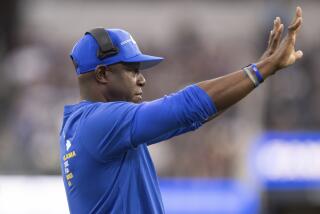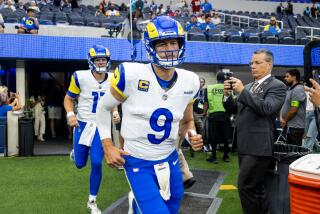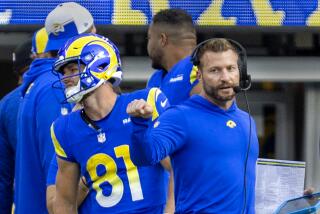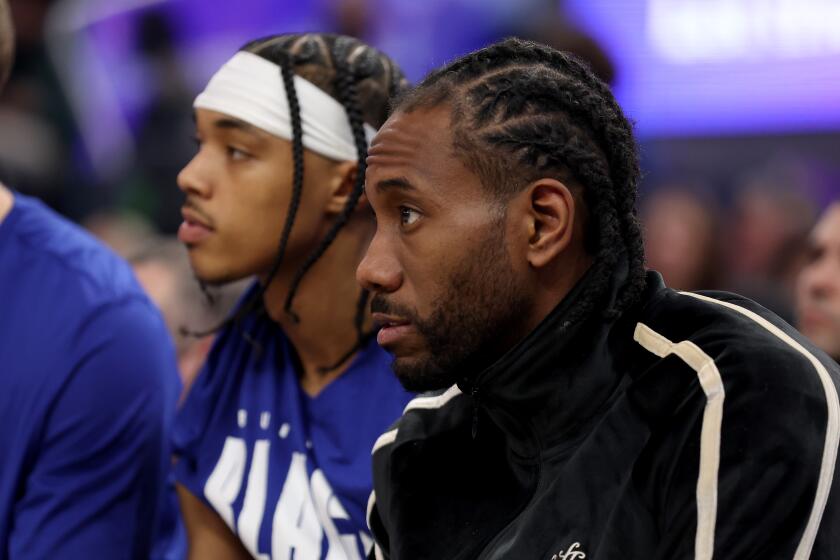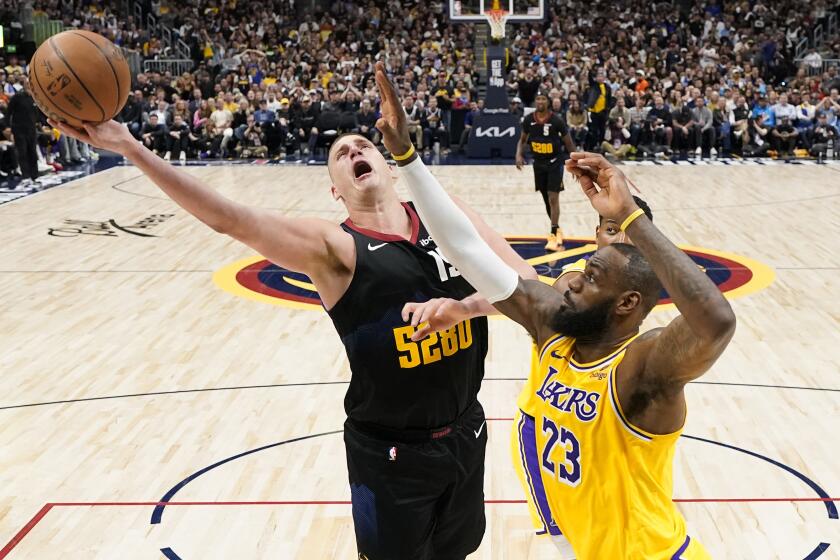St. Louis’ Sam Bradford plays beat the clock to learn new offense
—
Answering the bell is no problem for Sam Bradford, preparing for Round 2 of his NFL career.
Answering to the beeper, though, is a different story.
The St. Louis Rams quarterback is looking to build on his spectacular debut, a season that earned him NFL offensive-rookie-of-the-year honors. Now, he’s learning a new offense — without the benefit of a structured off-season — and waiting for Coach Steve Spagnuolo to break out the beeper.
That’s a timer that sits just behind the offense in seven-on-seven drills and gives Bradford precisely 2.7 seconds to get rid of the ball before a loud beep sounds, signaling he’s been sacked.
“It’s good in theory, and Spags loves it,” said Bradford, relaxing at Rams headquarters after a recent practice. “With seven-on-seven, sometimes you get lethargic. Your drops are slow, your reads are slow, everything’s slow because you don’t have a rush coming at you. The beeper’s designed to make you think that you have to get the ball out like that.”
Just because it’s “good in theory” doesn’t mean that Bradford doesn’t want to spin around and fire a bullet pass squarely at that annoying device.
“If your first read is there, you can beat the beeper,” he said. “But any time you have a progression and your first read isn’t there, and you’ve got to come back to three or four, you never beat the beeper. And that’s what drives me nuts. I’m on time, I’m on rhythm, and Spags is telling me I got sacked. I’m like, ‘No!’ ”
Said Spagnuolo: “He’s totally against it. I’m telling him, ‘It’s making you a better player,’ and he’s laughing, ‘Yeah, but I can always get out of the way of the rush and extend the play.’ That’s not what we’re trying to do with the thing.”
During the regular season, the coach brings out the beeper on Fridays and fines Bradford every time the beeper catches him, docking him about $700 last year. You might think that’s the kind of money a guy like Bradford would find under his couch cushions, considering he signed the richest rookie deal in NFL history: six years, $78 million with $50 million in guarantees. But by all accounts, Bradford lives an exceedingly normal life, or as normal as you can get for a budding superstar.
He rents an apartment. He drives a pickup. He goes to the movies every Tuesday. He eats at the same casual St. Louis restaurant every Friday night before a home game.
“Outwardly, he doesn’t have any of the vices you might expect of a 23-year-old multimillionaire,” said Kevin Demoff, the Rams’ chief operating officer. “He’s just grounded. That’s what makes him such a great fit for this market. He’s someone everybody can relate to.”
Few rookies could relate to the success Bradford had last season. He helped turn around a franchise that finished 1-15 in 2009, answering all questions about his durability (a shoulder injury cut short his junior season at Oklahoma) by taking every snap for the Rams. He completed 60% of his 590 passes, with 18 touchdowns and 15 interceptions, and directed St. Louis to a 7-9 record and the brink of the postseason. The Rams would have made the playoffs as champions of the lukewarm NFC West but fell short with a loss at Seattle in their finale.
That turnaround — though not complete — paved the way for Rams offensive coordinator Pat Shurmur to be hired as head coach of the Cleveland Browns. Josh McDaniels, fired as Denver’s coach last season, was hired to succeed him in St. Louis.
McDaniels favors a spread offense somewhat similar to the one Bradford ran at Oklahoma, where he won the Heisman Trophy in 2008. It’s significantly different from what the Rams ran last season, and everyone at team headquarters is trying to get up to speed.
“It’s all different, from the language, the communication, the way we call formations, the cadence, everything,” Bradford said, noting last year’s first day of offensive installation featured two play-action passes and more than a dozen drop-back passes, whereas this summer’s first installation had four drop-backs and at least 15 play-actions.
Bradford and the Rams are trying to learn a new language on the fly, a Berlitz to beat the blitz, if you will. In search of an early jump on McDaniels’ offense — and understanding he couldn’t have contact with coaches during the lockout — Bradford reached out to Charlie Weis, the former offensive coordinator in New England (where McDaniels’ philosophies were shaped) who now has that job at the University of Florida.
So Bradford tapped into Weis, who was in “install mode” anyway as he was preparing to teach the scheme to the Gators in his first season at the school.
Bradford soaked in everything he could from Weis “so that when I got back here and sat down with Josh for the first time, we were still starting from square one, but it wasn’t the beginning of square one. At least I had seen things, the language wasn’t foreign to me.”
What’s more, that impressed McDaniels, although it didn’t surprise him.
“I just know from the short time I’ve been around him, that Sam wants to know everything, wants to be good at everything, and he wants to do both of those things very quickly,” McDaniels said. “Whatever Charlie helped him with is great, but there’s really nothing that replaces live repetitions.”
Bradford understands that, and knows that practice is especially important when the team hasn’t had the luxury of a spring and early summer to pour the foundation for a new system.
As the unquestioned leader of his young team, and suddenly the dean of NFC West quarterbacks — a division that will feature new starting signal-callers in Seattle, Arizona and probably San Francisco — Bradford is preparing for it all: the installation, the video study, the constant repetition …
And that bleeping beeper.
twitter.com/LATimesfarmer
More to Read
Get our high school sports newsletter
Prep Rally is devoted to the SoCal high school sports experience, bringing you scores, stories and a behind-the-scenes look at what makes prep sports so popular.
You may occasionally receive promotional content from the Los Angeles Times.
